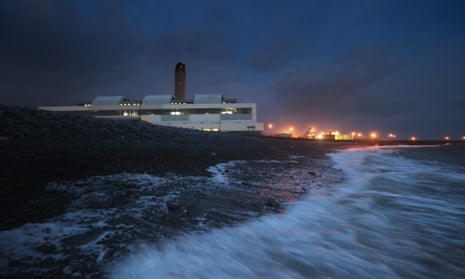The UK government is lobbying the European commission (EC) to keep open one of Europe’s dirtiest coal power stations, even though its nitrogen oxide (NOx) emissions exceed new legal limits by five times.
The EC has begun infraction proceedings against the UK because its proposals for reducing emissions under new European laws have been littered with “inconsistent or missing” data.
Aberthaw power plant in south Wales was named in the top 30 highest carbon-emitting plants in Europe by an alliance of NGOs last month. But its emissions of NOx, which causes respiratory problems and lung disease, are also extremely high.
The plant is specifically designed to burn coal from the local area, which is unusually difficult to ignite and needs a chemical catalyst added to make it burn. This process results in NOx emissions of around 1,000 mg/Nm3. The limit on NOx set by the European industrial emissions directive (IED) is 200 mg/Nm3. Under this new law, the 1,555MW plant would have to be shut down by 2016.
The EC and UK disagree on whether the plant qualifies for an exemption from the limits. An EC spokesperson confirmed that the UK continues to lobby for the plant to stay open, adding that “for the time being, the closure of the plant is not considered”.
A spokesperson for the Welsh government, which is leading negotiations on Aberthaw, said it hoped to come to an “acceptable resolution” but would not specify what the government defined as acceptable. He confirmed the UK’s Department of Environment, Farming and Rural Affairs (Defra) was also “heavily involved”.
Defra refused to comment, saying infraction cases are subject to a confidentiality agreement.
Greenpeace energy analyst Jimmy Aldridge said: “The fact that it’s [Defra] that is trying to keep one of the most polluting power stations in Europe open is beyond parody. If the government’s special pleading is successful then Aberthaw will continue to produce toxic emissions harming people’s health for years to come and seriously damage our efforts to tackle climate change.”
Aberthaw currently receives an exemption from the EC that allows it to emit up to 1,200 mg/Nm3 of NOx. This is based on previous UK pleas to allow the plant to continue because it was using low-volatility indigenous coal and supporting a major local industry.
The 43-year-old station operators, RWE npower, is now mixing local coal with other types of coal, that is easier to combust. Currently 30% of the coal on site is from overseas, mainly Russia. The EC exemption is based on the plant burning coal of less than 10% volatility. Now, it uses coals of between 6% and 15% and the UK has not provided precise data on the annual average volatility.
The EC says that it is therefore no longer eligible for the extra emissions.
The government disagrees with the EC and says Aberthaw should be treated as a low-volatility plant. Defra has submitted two Transitional National Plans (TNPs), which outline to the EC how emissions will be reduced, which include the maximum exemption of 1,200 mg/Nm3 for Aberthaw. It is unclear how long the UK is asking for the exemption to last. The EC has rejected both proposals and commenced formal infraction proceedings against the UK.
Unions are now worried that the conflict could leave no room for compromise and the plant could close in less than two years.
Aldridge says that if Aberthaw receives the full allowance of 1,200 mg/Nm3, it might not just water down emissions reductions for one plant, but the whole country. Under the UK TNP, plants would be given tradeable credits that they can sell to other more polluting plants if they reduce their own emissions.
In July, RWE npower announced plans to retrofit low-emission boilers to Aberthaw, with the potential to reduce NOx emissions by 60%. This could flood the UK market with meaningless emissions credits.
A spokesperson for rival power company Eon said special treatment should be avoided. “Our view is very much that each time special treatment is granted for a specific named plant, investments in emissions abatement that have been made in good faith, on the assumption that regulations will be implemented consistently, are undermined.”




Comments (…)
Sign in or create your Guardian account to join the discussion